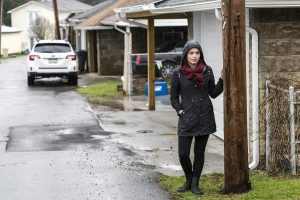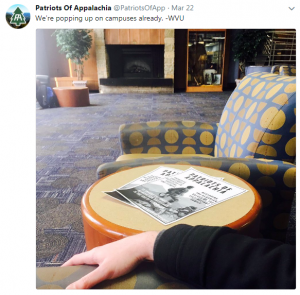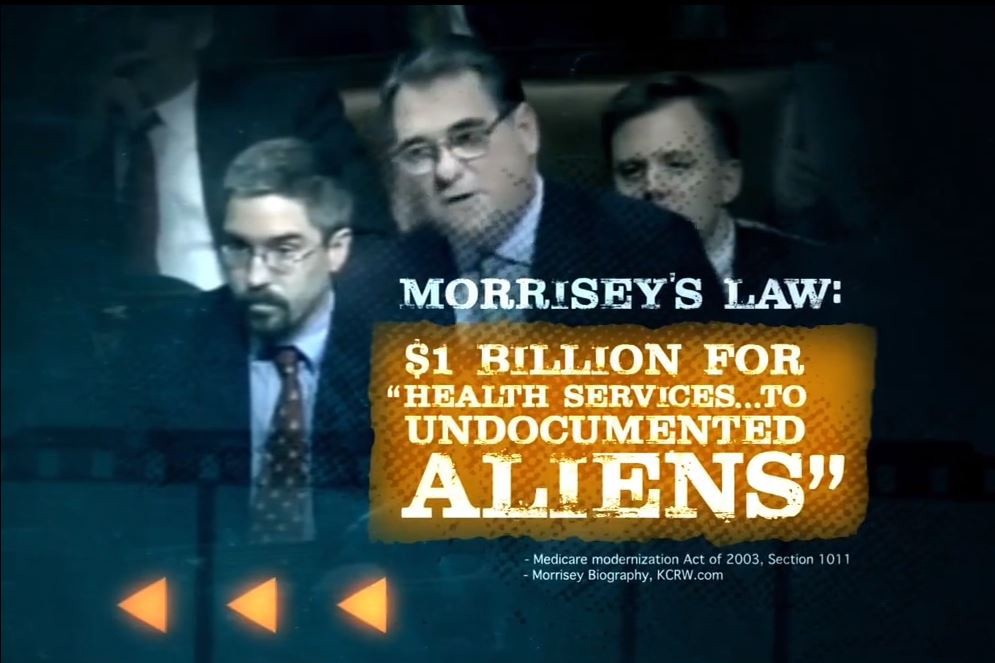A year ago this week, white supremacist groups descended on Pikeville, Kentucky, aiming to rally “white working families,” where they were met by anti-fascist groups from across Appalachia and elsewhere in the country. After a deadly incident in Charlottesville, Virginia in August, many of these white supremacist groups have fractured as a result of increased scrutiny and internal power struggles. But, there is evidence that remnants of those groups have recently sprung up in north-central West Virginia.
In late February, Fairmont resident Stephanie Carter was poking around on a community Facebook group when she saw a post that some suspicious flyers had gone up around town.
“The day after that post, I just went looking — walked around for a couple of hours and they had kind of narrowed it down based on some of the buildings that were surrounding where they thought it was,” Carter said. “And so, actually, it was right here on this pole.”
Carter points to a telephone pole in her working-class neighborhood about a mile from downtown Fairmont. The flyers were from a group called The Patriot Front, a neo-Nazi white supremacist organization — one that would fall under an umbrella known as the “alt-right.”
The flyers included language like “blood and soil” — a slogan known to represent Nazi ideology.
But other phrases on the flyers were more veiled, including “strong families make strong nations” and “life, liberty and the pursuit of victory.”
Carter acknowledged that others in her community might not have been able to recognize the more vague, seemingly-innocuous phrases on the flyers as messages from a hate group. So, she immediately pulled them down.

Photo by Jesse Wright | West Virginia Public Broadcasting.
A few weeks later, in March, more flyers began to spring up on the campus of West Virginia University in Morgantown. The flyers looked a lot like those the Patriot Front had placed around Fairmont — using the same font and similar designs. Like Carter in Fairmont, those who recognized the messaging on the flyers for what they truly were took them down.
But the flyers that appeared in Morgantown had come from the Patriots of Appalachia, a group that takes even more pains to hide its true intent.
The flyers attempted to brand the organization as a “fraternity dedicated to survival and fitness.” In taking a look at the group’s YouTube and Twitter accounts, their true motivation is clear.
After the flyers appeared around campus, WVU Provost and Vice President for Academic Affairs Joyce McConnell said the university was quick to respond.
“As soon as we knew about them, we notified our university police department because we always want to do everything we can to make sure people are safe,” McConnell said. “So, our chief of police, Bobby Roberts, immediately began an investigation on who may have posted the posters whether they were members of the campus community or where whether it was an organization outside the campus.”
McConnell said the WVU Police Department ultimately determined the flyers came from people outside of the campus community. University officials released statements to faculty and staff citing the First Amendment right to free speech, but also making it clear that “sentiments expressed on these flyers and endorsed by this group are contradictory to the very core of our institution.”
Ryan Lenz is a senior investigative reporter for the Southern Poverty Law Center, a non-profit that tracks the activity of hate groups in America. He said white supremacist groups aim to appeal to those who are unaware of their existence and motivations — from what’s printed on their flyers down to their names and branding.
“If you look at the Patriot Front and the Patriots of Appalachia, they’re very much cloaking their racist ideologies in imagery of patriotism, liberty and freedom-loving Americans. And, so, when you look at that, if you’re just a bypasser on the street you don’t think, ‘Oh my god that’s a hate group.’ You think, ‘What is this?’ — and all they really want is for someone to be curious enough to go down that perverse rabbit hole and come out the other end having been indoctrinated and radicalized,” Lenz said.
The SPLC has been closely watching groups like these since the early 1970s. In the wake of Charlottesville, they’ve paid closer attention to new groups on the alt-right like The Patriot Front.
While Patriots of Appalachia appear to be in a recruiting mode and might seem to be linked to the Patriot Front, their ideologies slightly differ and the two aren’t necessarily linked organizationally. But, Lenz said, they could share players in the alt-right movement.
“[The] Patriot Front is a little bit more about that ‘blood and soil’ fascism, whereas the Patriots of Appalachia are taking taking their cues from what Richard Spencer has advocated for — that being an ethno state, sort of an alt-right ethno state, where whites would separate from all other ethnic groups for the purposes of racial hegemony,” Lenz said.

Attempts via email and Twitter to reach the Patriots of Appalachia, as well as an individual identified as being connected to the group, went unanswered.
Lenz said there has been considerable debate among modern-day hate groups on the alt-right about whether they should portray themselves explicitly as white supremacists or shroud their ideologies in a less noticeable fashion.
“This is a matter of optics. For years, racists in America paraded in whatever costumes or attire were appropriate for their ideology. You had neo-Nazis in Illinois [with] swastika armbands and marching through the street — not even to mention the history of hooded Ku Klux Klan men and the Klansmen in the south,” he said.
Lenz warns to not be fooled by the use of the word “patriot” in the name of a hate group. He also says that, although some of these groups are not fully organized, there’s always the potential for violence.
“Make no mistake about it, white supremacist ideas — no matter how they are packaged — have the propensity for violence. I’ve often said it and I’ll say it again: It’s not a matter of if these ideologies turn violent, it’s when they turn violent,” he said.
The Southern Poverty Law Center urges people to be on the look-out for this kind of activity and alert law enforcement if they see something suspicious.
This article was originally published by West Virginia Public Broadcasting.



